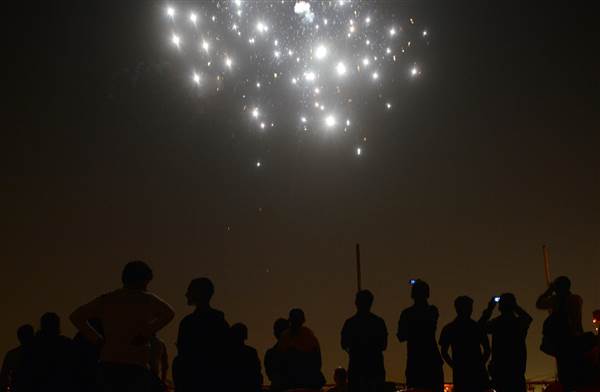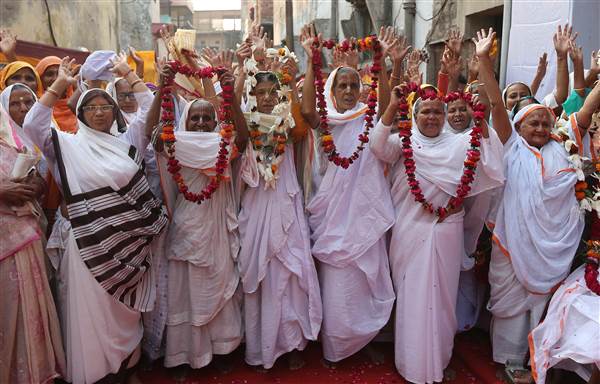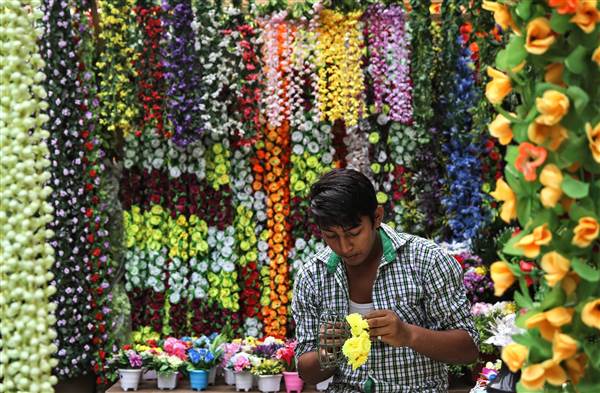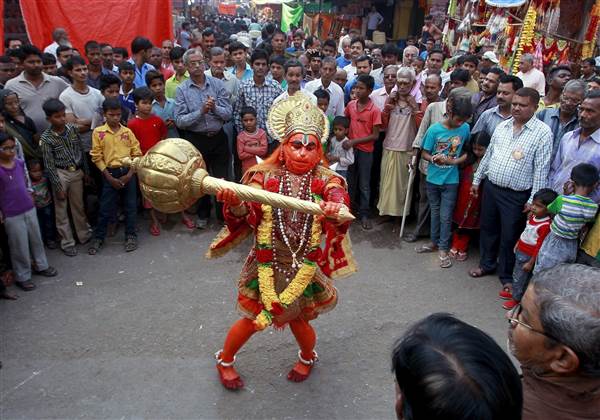In the Little India district of Artesia, Calif., the streets become illuminated ahead of Diwali. For millions of Indians who live away from India, celebrating Diwali is a way for them to stay connected to their roots.
As the second most populous nation on earth celebrates one of the world's brightest and most festive holidays, Indians on the subcontinent and around the world are gathering for a time of family, gifts, and reflection.
Outside of India, Diwali is colloquially referred to as "Indian Christmas." It also marks the start of Hindu new year—no different than a calendar reset one week after Christmas in the western world. Diwali, or "the Festival of Lights" signifies good triumphing over evil, the end of darkness. This year, Diwali falls on Wednesday, Nov. 11.

----
On Nov. 7, at an outdoor event in Artesia, several local community groups joined together with about 2,500 people at Artesia Park, one block away from Little India to watch a cultural program filled with young children and teenagers performing regional dances, such as Bharat Natyam, Bhangra, and Kathak. Booths surrounded the stage, filled with vendors offering Punjabi, Hyderabadi, South Indian, or other regional cuisine.
Public Diwali celebrations dot local communities around the world but the Festival of Lights is intimately honored as a family affair. Some celebrate the holiday at temple or by performing religious rituals at home, such as cleaning the house and doing a "puja," or prayer.
"We now live in San Francisco and get to participate in the same traditions as I did growing up in New York," Sejal Patel Daswani told NBC News. Daswani grew up in New Jersey and now lives in the San Francisco Bay Area with her family. "Our children also participate in the grand Diwali celebrations and there are also special guidance annually with the timings, audio, and step-by-step instructions on how to do the Diwali puja."
Dawani adds that Diwali helps her stay in touch with her Indian heritage. "We share it with friends and family at the temple and continue the similar traditions at home. I think Diwali is celebrated across the USA in a lively and proud manner."

---
For Las Vegas resident Swati Khamamkar, who spend time living in Southern California and Chicago before moving to Nevada to raise three daughters with her husband, Diwali has served as a connection to her parents.
"Growing up in this country we celebrated Thanksgiving and Christmas, as well as Diwali and other Indian Holidays. It is what always anchored me to a country I knew about only from what I learned through my parents," Khamamkar told NBC News. "As a young person growing up in Chicago I didn't want to share my holidays with my 'American' friends for fear of being laughed at or misunderstood. But I always looked forward to Diwali with my parents because of the way it made me feel spiritually."
Khamamkar said she maintains her family traditions each Diwali, performing Maharashtrian rituals and prayers with her mother and sister. There was always a gift exchange.
Her eldest daughter, Saleena, is currently a student at UC San Diego, meaning Diwali celebrations are a little more difficult.
"Now that our oldest is away and cannot physically be here, we improvise. In the past we have been able to get together somehow. This year will be tough because she can't come home due to exams. So I will send her a care package and we will celebrate during Thanksgiving," Khamamkar said.
Celebrating the Festival of Lights has come full circle for Khamamkar, she said, acknowledging the importance the holiday has in her and her husband Rajeev's lives. "We don't have family here other than our parents and two siblings, so it is a time to make the effort from our busy lives, and come together to make memories we will cherish and teach traditions that my girls will hopefully carry on with their families," she said.

---
Medha Jaishankar, the daughter of an Indian diplomat, told NBC News she grew up experiencing Diwali around the world. She was born in Delhi, but has celebrated Diwali in East Asia, Eastern Europe, the United States, as well as in India. Jaishankar now works as a film executive in Hollywood, but the Indian holiday stays with her and is a welcomed celebration.
"Whenever Diwali rolled around the corner, the big question was whether the country we lived in allowed firecrackers or not," Jaishankar said. "My earliest memory of Diwali consists of my mother and grandmother trying to teach me how to hold a lit sparkler. They also taught us how to light candles throughout the house and to this day the smell of matchsticks reminds me of Diwali celebrations."
Jaishankar described Diwali outside India as a time to bond and be merry.
"Diwali outside India is like Thanksgiving for American expats abroad. It's a good time to reconnect with the local Indian community and bond over food," she said.

---
These days, Jaishankar spends her Diwali in Los Angeles with friends. "Nowadays in Los Angeles, a few of us Indians who work in Hollywood get together to eat, drink, and play cards...It's a good time for us to get together though since we're a rather small community within Hollywood," she said, adding that Diwali evolves with people as they grow.
"As a child, I always looked forward to opening up new types of firecrackers with my grandfather, and receiving gifts of various sorts from other relatives," Jaishankar said. "However, nowadays Diwali has become less about bonding with members of my family and more about staying in touch with the Indian community at large."
Diwali is ultimately a part of Indian identity, a way to stay connected to culture, and a reminder of all things important in our lives, screenwriter and author Sameer Acharya told NBC News.
"Diwali is a point of pride for many Indian Americans, in part because it's part of our identity in this country," Acharya said. "One thing about Diwali which I've noticed recently, is that it's really a great excuse to reach out to people whom you may not regularly speak with, but care about. Every year when Diwali comes, our phones are usually ringing non-stop from family members, friends, and even old colleagues and it's a great chance to reconnect."
- NBC News